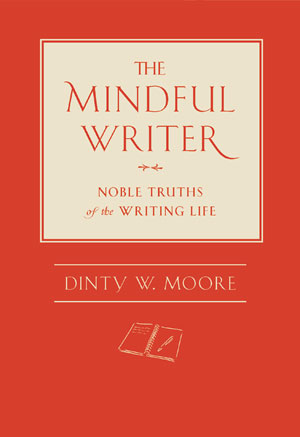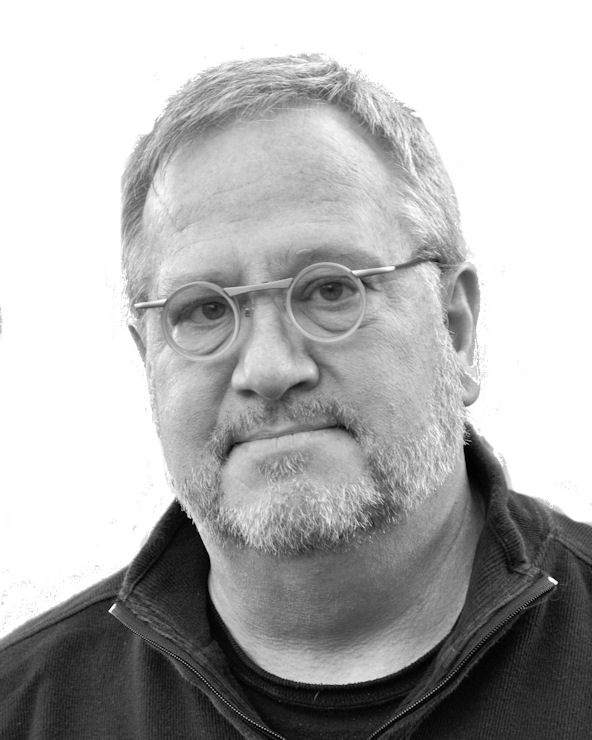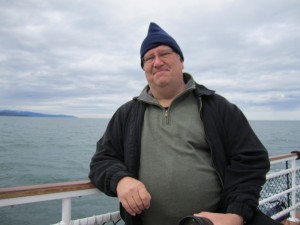The Writer Games: An Interview with Dinty W. Moore
categories: Cocktail Hour / Table For Two: Interviews
2 comments
.
BR: As always, Dinty, my first question is this: Where do you want to have our pretend meal?
DM: I would like to have our pretend meal at the base of the Kachemak Bay glacier.
BR: Very near to where we last actually sat down to eat together, in Salmon Bay, at that cool restaurant over the otter-filled waters of Kachemak Bay. But that was then, and involved a boat ride and wine. This of course, will be different. The glacier is a wild place. May require helicopters.
DM: I had my heart set on a tandem kayak.
BR: Okay, a plus-size tandem and the food comes in by helicopter…
DM: No, no. We hunt for our food, or fight to the death and one of us eats the other. That’s the natural way.
 VOICEOVER: Every year, as all citizens know, the overlords in the Capitol oversee a pageant, a lottery to see which writers will represent their districts in a battle against one another and against the elements, also hunger. This all started because writers got too big for their britches in a time not so long ago, the age of Mailer, and what’s her name, with the white stripe in her hair. (Crowd in capitol hisses.)
VOICEOVER: Every year, as all citizens know, the overlords in the Capitol oversee a pageant, a lottery to see which writers will represent their districts in a battle against one another and against the elements, also hunger. This all started because writers got too big for their britches in a time not so long ago, the age of Mailer, and what’s her name, with the white stripe in her hair. (Crowd in capitol hisses.)
BR: (Working out in preparation, a blur of one-armed pushups): You’re going to be a hell of a meal, Dinty. But first, let me introduce you. Dinty W. Moore, as you know, is the author of a number of books: Toothpick Men (short stories), Between Panic and Desire (nonfiction), The Accidental Buddhist (immersive nonfiction), and Crafting the Personal Essay (instruction). He’s also an editor and teacher and administrator, and past president of the Association of Writers and Writing Programs (AWP). His newest book, and the occasion for this interview, is The Mindful Writer, and has just been published by Wisdom Publications. It’s a brilliant application of Buddhist thought to the trials and processes of writing, and it’s also a book of quotations, each glossed and discussed in the great light of Buddha.
VOICEOVER: Dinty and Bill, old friends. But today, one of them must die.
BR: I met Dinty W. Moore at Lee Gutkind’s Creative Nonfiction Conference at Goucher College, where I fumbled an introduction Lee asked me to make, calling our man Dinky in front of a vast crowd of hopeful writers. But Dinty is not Dinky in any way. We next met right here in Alaska, across the water there on the Homer spit in Kachemak Bay, where we were teaching at the wonderful Kachemak Bay Writers Conference, in probably the most beautiful spot on Earth.
VOICEOVER: And then they were picked for the Writer Games.
BR: Dumped on the glacier!
VOICEOVER (film clip background): Dinty and Bill scrambled for tools, the things that would keep them alive, clearly visible in diabolical piles protected by their deadly fellow scribes. Bic pens and yellow pads. Facebook. A toaster. One of those bagel-cutting guillotines. Also numchuks. Dinty Moore darts in and recovers a letter opener, not bad, and then—risky—a yellow highlighter. And here comes Bill, full sprint, agile as a dump truck. He passes the huge advance, turns his nose up at tenure, darts past the spears and arrows and bowls of acid flung in his direction and grabs a small, beautiful book. It’s. It’s. It’s The Mindful Writer! Brilliant—the most powerful tool in the mix! Days have passed. Writers are falling like, like people who are falling. And here in the late going Dinty and Bill have found one another on the glacier, and formed an alliance. Pacifists both, it’s going to be a difficult finish: only one may live. Meantime, safe in their hiding place, a pile of glacier-strewn boulders, they chat.
BR: Dinty, my friend, you are an impressive collector of quotations. I know this from talking with you and from Brevity Blog, also from Facebook, and now, of course, from The Mindful Writer. What’s your method, and why quotations? And what should the epigraph for our interview be? (These snow fleas are delicious.)
DM (scanning the glacier, the ocean, the mountain for danger, eating snow fleas): I have a few books of quotations, and a few internet sites I can go quickly if I’m looking for a quote of the day. Sometimes I just Google in the name of an author followed by the word ‘quote,’ if it is that author’s birthday, for instance. Lately though I’ve enjoyed pulling quotes out of the middle of craft articles that I am reading. I feel as if I am adding something new to the recurring stream of writerly advice. Why quotations? They are quick to absorb, perfect for a status line, and frankly, we shouldn’t be spending so much time on Facebook, Twitter, and these infinite blogs. We should be writing.
BR: Infinite Blog, great title for a book. I believe you killed the author of that one with that typewriter that came down by mini-parachute.
DM: (grim-faced, remorseful) The epigraph for this interview should be this from theoretical physicist Wheeler: “Time is what prevents everything from happening at once.”
BR: Love it. Though in some ways everything IS happening at once. I’m sad my leg was sawn off by that poet we ran into, for example. But the starfish balm is working and I’m almost back together. Speaking of legs, you’re a great dancer–no, no, I’ve seen you, down there in Homer at Alice’s Champagne Palace? After Stephanie Elionzo Greist’s reading? With all the movement she put into it, brilliant? You were up next—hard act to follow—and just broke a few steps to much delight and by way of segue (or segway, as a student once wrote). And then you read a really affecting memoir about family. A great reading altogether. But tell us, tell us about your dance days.
DM (chipping at the ice with his letter opener, delicate rhythm): For about four or five years, in my younger, considerably slimmer days, I earned my living as a professional modern dancer. I worked with an experimental dance theater company that toured up and down the East Coast in a ramshackle van, hauling lights and curtains in a trailer. We would pop up on a college campus early in the morning, assemble the stage in a cafeteria or student union, and perform that evening. Sometimes we performed on real stages – The Walnut Street in Philadelphia, Riverside Church in NYC – but usually not.
BR: Does dance turn out to have anything to do with writing?
DM: What I learned from dance is something I still struggle to put into words. In many ways, the dancer is the paint, or the words. So in the studio, when the choreographer, Trina Collins, would move me around – do that faster, do this slower, start on the ground and then come to standing – I was being revised upon. I learned that the creative process involved trying a phrase fifteen different ways, and then settling on either the best placement and execution of that phrase, or throwing that phrase away and starting over. Endless revision. Often in dance the reason a certain movement phrase worked best couldn’t be put into words: it belonged in the kinetic/visual realm. Often in my writing, I rely more on my ear than my intellect. So all of that is related and all of that is still difficult for me to put into words. But it was a gift, having been a dancer. Truly a gift.
BR: Were you already involved in Buddhist study and practice?
[The sound of shouting and clobbering is heard in the distance, anxious voices, a scream]
DM: I’ve been a toe-dipper in the great Dharma since my college days, which is a fancy way of saying I approach Buddhism in a rather hit-and-miss fashion. I never donned orange robes or turned away from a regular life to allow steady meditation, except every once in a while when I would go off to a week-long retreat. But slowly the ideas behind Buddhist practice worked their way into my daily life, and even if I don’t outwardly seem any more Buddhist than your neighborhood auto mechanic, the ideas are in my mind and influencing how I approach trouble, conflict, and self.
BR: My neighborhood auto mechanic is Buddhist, in fact. And holy kazolies! Here comes a pack of screenwriters wielding razor-sharp clichés and unassailable, pat structure! What do we do?
DM: Buddhism teaches me that I can’t control certain events and challenges in my life, but I can control how I react to those events and challenges, and in that control, I can waste a lot less energy and create a lot less pain by not struggling against something that cannot be changed. That’s Buddhism to me, in a nutshell. Plus you try to breathe. Plus you try to sit still sometimes. Plus you are kind to other people. Plus you wake up every couple of weeks and realize what a miracle it is that there are red and black birds in the cherry tree in your backyard, and they are singing.
BR: Nice. I love that. And a great quotation stops me cold. I have to sit and think about it, sometimes for days, and usually say it to someone, just to get their help understanding it. Because we all find different layers of meaning in the simplest statements. In your book, Dinty, you are right there after each quotation to offer your thoughts, add them to mine as reader, help me understand the depths. So I loved, for example, having your voice after hearing this thought from Stephen Dunn, who once kicked my ass at tennis (and is at this moment, in fact, beheading Carol Muske-Dukes out there on that seagull island): “Your poem effectively begins at the first moment you’ve surprised or startled yourself.” Were there moments in the making of The Mindful Writer that startled you?
DM: What startled me was just how much agreement there is between writers, and for that matter, between artists of all stripes, about the mystery of it, about the voices that come in the middle of the night showing you a path you hadn’t seen, about the beauty of “accidents” and how they can set you out on an unexpected, beautiful new direction. I was also struck by how many of these writers came back to the power of words: not words as markers that are used to set down meaning, but words as guides and signals to help locate meaning.
BR: “Accidents.”
DM (brandishing his highlighter as if it were a sword, sharpening his letter opener against it comically): “Accidents.”
BR: Any particular favorite quotes we should mention here?
DM: Actually, the Dunn quote you just cited is among my favorites, but in the end I love them all. Of particular pleasure was exploring the words of Flannery O’Connor, a staunch Catholic who would likely have spit in my eye if I told her that I thought she was Buddhist. Well, she wasn’t Buddhist, of course, but her discussions of grace and of that “peculiar crossroads where time and place and eternity somehow meet” reminded me so much of karma and enlightenment, that I came back to a conclusion that many others have had over the years, the conclusion that our world religions are not all that different. The giant institutions, the Vaticans and Holy Cities and Potala Palaces create very different ritual and ceremony, but the basic messages are so much the same.
BR: “Thou shalt not kill,” etc.
DM: “Do unto others.” Also, “Anger poisons the one who is angry, so turn the other cheek.”
BR: You treat writing as a spiritual practice, which it certainly is. But in the case of writing, or the making of art in general, what’s the spirit?
DM: The human spirit. That part of us, whatever it is, that makes us think and love and wonder.
BR: Is it all so rosy though? And aren’t things a little broken much of the time? How do we fix it? Is writing enough?
DM: I’m not much of an activist. I admire so much those folks who have the energy and inclination to protest, to face arrest, to give speeches and knock on doors. I’m pretty quiet in my politics, and despite the book, I’m pretty quiet about my spiritual beliefs. That’s just me.
VOICEOVER: There has been a change of rules, writers. Repeat. A change of rules. We are entering conscientious pacifism into the mix of weaponry!
BR: Tell us about your career. I ask this of everyone before I eat them, because so many readers of Bill and Dave’s are grad students or newer writers looking for reassurance and/or role models.
DM: Probably the most important thing to know about my writing career is that I didn’t even begin getting serious about it until I was in my thirties. Then I went off to grad school and started publishing some short fiction, wrote three failed novels, and eventually published a book of nonfiction. That part of the journey took about ten years, and since then I’ve published many more books, but it was the stubbornness and doggedness in the early days that got me here, in my comfortable modest success. So many writers I know tell the same story: when others gave up, they got twice as tenacious.
VOICEOVER: We were kidding. About the pacifism. This Writer Games interview ends with dinner!
BR: From the book, Dinty, and from hanging out with you, also from talking to people who’ve sat under your tree, I know you’re a wonderful teacher. How does teaching fit into your writing practice? And how do you get the time to do anything else?
DM: I love teaching because I love people, and I love conversation, and I love thinking about the mechanics of writing, so it is pretty much a happy part of my career. But yes, there is always the juggling, and always the wish that maybe we could perhaps comment on a few less manuscripts and have a few more hours for writing. I do a lot of department service as well as serving as director of the creative writing graduate program, so balance is always an issue. My answer is to write first thing in the morning, before other concerns and responsibilities intrude.
BR: And speaking of time, how have you fit family into your writing and thinking career?
DM: Probably not well enough. You would have to ask my daughter and wife. They are certainly patient with me, and they both love writing and books, so at least I have a sympathetic team, but there are so many times I’m banging away at the keyboard instead of just sitting around at the kitchen table talking, and I worry I will someday regret those times. Oh, Bill, you do ask the hardest questions! I thought this interview was going to be fun.
BR: You were born on my older brother’s birthday, August 11, and yet you’re younger than I. What’s that all about?
DM: I’ve warped the time-space continuum. Plus I actually am your brother. We are one and the same person, in two different bodies. There is much you do not understand.
BR: Randy?
DM: Quickly as you can, snatch the pebble from my hand.
BR: Ouch! Mom! Mahm!
VOICEOVER (in an eerie Mom voice): Sort it out between you boys.
BR: But he….
VOICEOVER (as Mom, and mocking): The big fish eat the littler fish, and the littler fish eat the littler.
RODNEY KING (hurrying past, huge crowd of white cops chasing): Can’t we all just get along?
BR: Fine, Rodney, and by the way, good book. Dinty, you invented and built and have overseen and loved the on-line magazine Brevity. Which is, I think, is the first Internet literary magazine. Could you tell us about its inception? And what’s happening with it now?
DM: No, we are not the first, but this is our fifteenth birthday or so, which makes us one of the first, and one of the few to survive this long. We are probably the first in nonfiction. I’m proud that we are now paying our writers, even if just a modest $45 per essay. And I’m proud that so many people visit our blog and magazine site. But it is exhausting work to keep it going some days. Any literary magazine editor, paper or digital, will tell you that. You do it out of love.
BR: But I hate Bill and Dave’s. Is the Internet a curse or a blessing for the spirit?
DM: Both.
BR: For the writer?
DM: Both.
BR: For writing?
DM: Both.
BR: For the world?
DM: It probably depends where you are sitting, but information seems to be more free because of the Internet, and the truth is a powerful tool. As long as people—dissidents and artists and grass roots organizers and parents of autistic children and gay folks and soldiers and bullied children—continue to find ways to use the internet to spread honest information, to speak against forces that would lie and distort, I think the technology is going to be more good than bad.
BR: Anything else you want to say?
DM: Where’s my cocktail?
BR: It’s right here, my friend. It’s right here….
[LIKE Bill and Dave’s and avoid being eaten! Follow Bill on Twitter: @billroorbach]





Stimulated by this, and already having gotten the book, I read it and just interviewed the Dintmeister myself for my blog:
http://richardgilbert.me/2012/05/20/qa-dinty-w-moore-on-buddhism-creativity-compassion-taming-the-noisy-ego/
Hey, this is a great interview, and fills in all the gaps I left. Love that Dinty. Sorry to have to kill him.